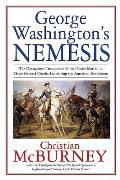Two Revolutionary Symposia Coming Up in New York
Saratoga 250 will host its fourth annual Turning Point Symposium in Schuylerville on 3 May with these speakers:
- Dr. Phillip Hamilton – “Washington’s Artillerist: Henry Knox Commands the Continental Guns”
- Matthew Keagle – “My Dinner with Andre?: Henry Knox Arrives at Fort George on Lake George”
- Dr. Bruce M. Venter – “Irascible Ethan Allen: He Cared Little About Ticonderoga’s Guns”
- Michele Gabrielson – “American Calliope: The Writings of Mercy Otis Warren and Her Friendship with Henry Knox”
- Dr. Mark Edward Lender – “The Woman at the Gun Reconsidered: Molly Pitcher’s Legendary Performance at Monmouth”
The following day, 4 May, Hamilton will conduct a bus tour of the “Sled Tracks of Henry Knox.” That has a separate registration cost.
At the end of the month, the Fort Plain Museum convenes its annual American Revolution Conference in Johnstown. This year’s presenters include:
- Pulitzer Prize winner Rick Atkinson – “The Fate of the Day: The War for America, Fort Ticonderoga to Charleston, 1777-1780”
- Maj. Gen. Jason Q. Bohm, U.S.M.C. (Ret.) – “The Birth and Early Operations of the Marine Corps: 250 Years in the Making”
- Alexander R. Cain – “We Stood Our Ground: 250th of the Battles of Lexington and Concord, April 19, 1775”
- Abby Chandler – “Choosing Sides: North Carolina’s Regulator Rebellion and the American Revolution”
- Gary Ecelbarger – “The Mammoth of Monmouth: George Washington’s 1778 Campaign in New Jersey”
- Michael P. Gabriel – “Richard Montgomery and the Other Invasion of Canada”
- Shirley L. Green – “Integrating Enslaved and Free: Rhode Island’s Revolutionary Black Regiment”
- Don N. Hagist – “Marching from Peace into War: British Soldiers in 1775 America”
- Patrick H. Hannum – “The Virginia Campaign of 1775-76: Kemp’s Landing & Great Bridge”
- Wayne Lenig – “The Mohawk Valley’s Committee of Safety in 1775”
- James L. Nelson – “Bunker Hill: The First Battle of the American Revolution”
- Eric H. Schnitzer – “Breaking Convention: How a Fussy Detail about British Uniforms Doomed Burgoyne’s Army to Captivity”
- William P. Tatum III, Ph.D., the James F. Morrison Mohawk Valley Resident Historian – “‘To Quell, Suppress, and Bring Them to Reason by Force’: Combatting the Loyalist Threat in New York during 1775”
- Bruce M. Venter – “‘It is infinitely better to have a few good men than many indifferent ones’: Ethan Allen and the Green Mountain Boys Take Fort Ticonderoga”
The Fort Plain conference also offers a bus tour—in this case beforehand, on Thursday, 29 May. Alex Cain will guide attendees along the Battle Road in Middlesex County, Massachusetts. So that would be a busman’s holiday for folks coming from the Boston area.








